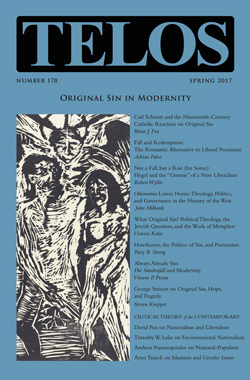Is there any genealogical connection between Christian oikonomia and modern political economy? Originally the turning of polity into household and interpersonal “pastoral” rule was not sinister but an advance. Likewise the Christian doctrines of Trinity and Incarnation resolved rather than sustained aporias of the reserved versus the economizing deity. However, later developments with the Franciscans, Palamites, and Jansenists effectively undid this resolution, producing a new “gnostic” duality. Economic rule was now sundered from ethics in a fallen world seen as utterly depraved. The heterodox discourse and practice of political economy resulted.
|
Telos 178 (Spring 2017) is now available for purchase in our store. Although a frustrating incalculable for the engineers of government, religion must be acknowledged as that without which the techniques and technologies of human subjectivity would not exist. I am not here arguing for the adoption of certain religious practices or beliefs, but simply qualifying the centrality of the political by insisting on the necessity of the religious. I maintain that the asymmetry characteristic of all civilizations stems from ruptures that I describe as religious, or evental—terms that I maintain are equivalent. To probe the intricacies of asymmetrical warfare in the twenty-first century is to ask, “Whence and whither the Event?” Ten characteristics of the patterns of ethnic conflict in Europe—the way they are reflected in media and culture. They serve as the key to conceptual understanding of the nature of confrontation, aggression in communication in the public sphere in Europe at present, and erosion of democratic values The process of secularization is insufficient if, voided of its original pathos, it leads to any form of sacralization of the immanence. Secularism becomes insufficient, if not harmful, in the same way as religious fundamentalism, if it becomes an obstacle to building pluralistic coexistence. Therefore, secularism should acknowledge the emergence of religious challenges. Religion has found, in the crisis of reason (metaphysical, scientific, and political), an opportunity not only to be present in the public sphere, but also to demand the right to equal treatment—appealing to the same democratic principles of secularism—and the right to political participation. Secularism cannot respond to these challenges with another form of “enlightened fundamentalism.” In his account of the impact of Islam on Europe, Michael Ley pulls no punches, especially for all those readers, like the present reviewer, who still hope that a Muslim humanism and not Islamist terrorism will become the primary social movement in global Islam in the years to come. In a nutshell, Ley’s main theses are the following: Orthodox and radical Islam are the scourge of humanity. Ley calls Sharia Islam “the worst danger for democracy and human rights in the 21st Century.” Only an Islam without Sharia is compatible with human rights. Yet that is a vision for the future; current reality, according to Ley, is different. The Islamization of Europe is, according to Ley, the most visible change in most European societies. While liberal and educated citizens consider the increasing influence of conservative and radical Islam with great concern and regard the future of the continent as rather bleak, their so-called progressive opponents interpret the ongoing Islamization as a cultural enrichment that contributes to the historical overcoming of the obsolete nation-state. Ley goes as far as to say that today the pioneers of radical post-national Europe would prefer to abolish all symbols of national identity: indigenous Europeans should waive all national, cultural, religious, and ultimately also traditional sexual identities. |
||||
|
Telos Press Publishing · PO Box 811 · Candor, NY 13743 · Phone: 212-228-6479 Privacy Policy · Data Protection Copyright © 2025 Telos Press Publishing · All Rights Reserved |
||||



